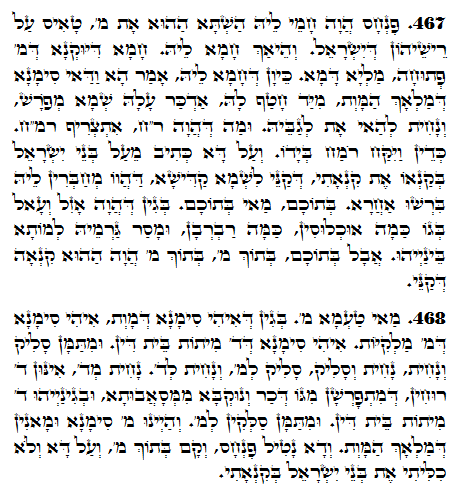Daily Zohar # 1235 – Pinchas – Don’t take your time, jump
Daily Zohar 1235
Daily Zohar 1235
Zohar Pinchas, Vol. 20 (English)/Vol 15 (Hebrew)
Hebrew translation:
468. מַה טַּעַם אוֹת מ’? מִשּׁוּם שֶׁהִיא סִימָן שֶׁל מָוֶת, הִיא סִימָן שֶׁל מ’ מַלְקֻיּוֹת. הִיא סִימָן שֶׁל ד’ מִיתוֹת בֵּית דִּין. וּמִשָּׁם עָלָה וְיָרַד, וְיָרַד וְעָלָה. עָלָה לְמ’, וְיָרַד לְד’. יָרַד מִד’, שֶׁהֵם ד’ רוּחוֹת שֶׁנִּפְרָדוֹת מִתּוֹךְ זָכָר וּנְקֵבָה מֵהַטֻּמְאָה, וּבִגְלָלָן ד’ מִיתוֹת בֵּית דִּין. וּמִשָּׁם עוֹלִים לְמ’. כְּלוֹמַר, מ’ סִימָנִים וְכֵלִים שֶׁל מַלְאַךְ הַמָּוֶת. וְזֶה לָקַח פִּנְחָס וְעָמַד בְּתוֹךְ מ’, וְעַל זֶה נֶאֱמַר וְלֹא כִלִּיתִי אֶת בְּנֵי יִשְׂרָאֵל בְּקִנְאָתִי.
Pinchas 467-468
Numbers 25:11
“פִּינְחָס בֶּן-אֶלְעָזָר בֶּן-אַהֲרֹן הַכֹּהֵן, הֵשִׁיב אֶת-חֲמָתִי מֵעַל בְּנֵי-יִשְׂרָאֵל, בְּקַנְאוֹ אֶת-קִנְאָתִי, בְּתוֹכָם; וְלֹא-כִלִּיתִי אֶת-בְּנֵי-יִשְׂרָאֵל, בְּקִנְאָתִי”
“’Phinehas, the son of Eleazar, the son of Aaron the priest, hath turned My wrath away from the children of Israel, in that he was very jealous for My sake among them, so that I consumed not the children of Israel in My jealousy.”
The Zohar brings additional revelations related to the ‘jealousy’ of Pinchas.
The letter מ Mem is the aspect of the male of the other side and the letter ת Taf is the aspect of female of the other side (Sitra Achra). The letter ו Vav from the word for death, מות is the aspect of Yessod that connects the male and the female of the other side and brings death on the living.
Before Pinchas intervened, the Israelites were in sexual relation with the daughters of Moab. That action connected the Vav, which is Yessod of the pure side with the Malchut of the other side. The light and energy of the Israelites started draining to the other side. God asked Moses to remove the people that were involved with the negativity so (Numbers 25:$) “the fierce anger of YHVH may turn away from Israel.’”
God’s anger קנאה is a cleansing process as we explained in previous studies. It removes the negativity from existence. Moses began the cleansing process when Zimri, the head of the tribe of Shimon and Cozbi, the daughter of the head of the Midianite engaged and escalated the negativity to a higher level. That action required higher level of response. The letter Mem in the sky was getting filled with impure blood and Pinchas had to jump and grab it before the angel of death.
The verse above says that Pinchas was jealous ‘among them’, ‘בְּתוֹכָם’. The Hebrew meaning is ‘in their midst’ בתוכ the letter ם Mem. Mem is the 13th letter of the Alef Bet and represent the balance and the connection to YHVH as it is constructed from the letters Kaf כ and ו vav that numerically equal to 26 as the YHVH.
Pinchas was ready to die and he went among the people to save them. In the full story he did die and was resurrected immediately with the souls of his uncles, Nadav and Avihu who also gave their lives for a higher purpose.
The first lesson that I want to bring here is that God’s anger is an effect to a cause of negativity from the lower levels. Its purpose is of cleansing it and we should not complain about ‘Why God is mean to me…’.
Second lesson is that we can stop God’s anger with positive actions. In the world of correction, we benefit from the element of time. It is the aspect of mercy that gives us time to correct before the ‘anger’ comes into our lives.
{||}

 Previous: Pinchas
Previous: Pinchas
